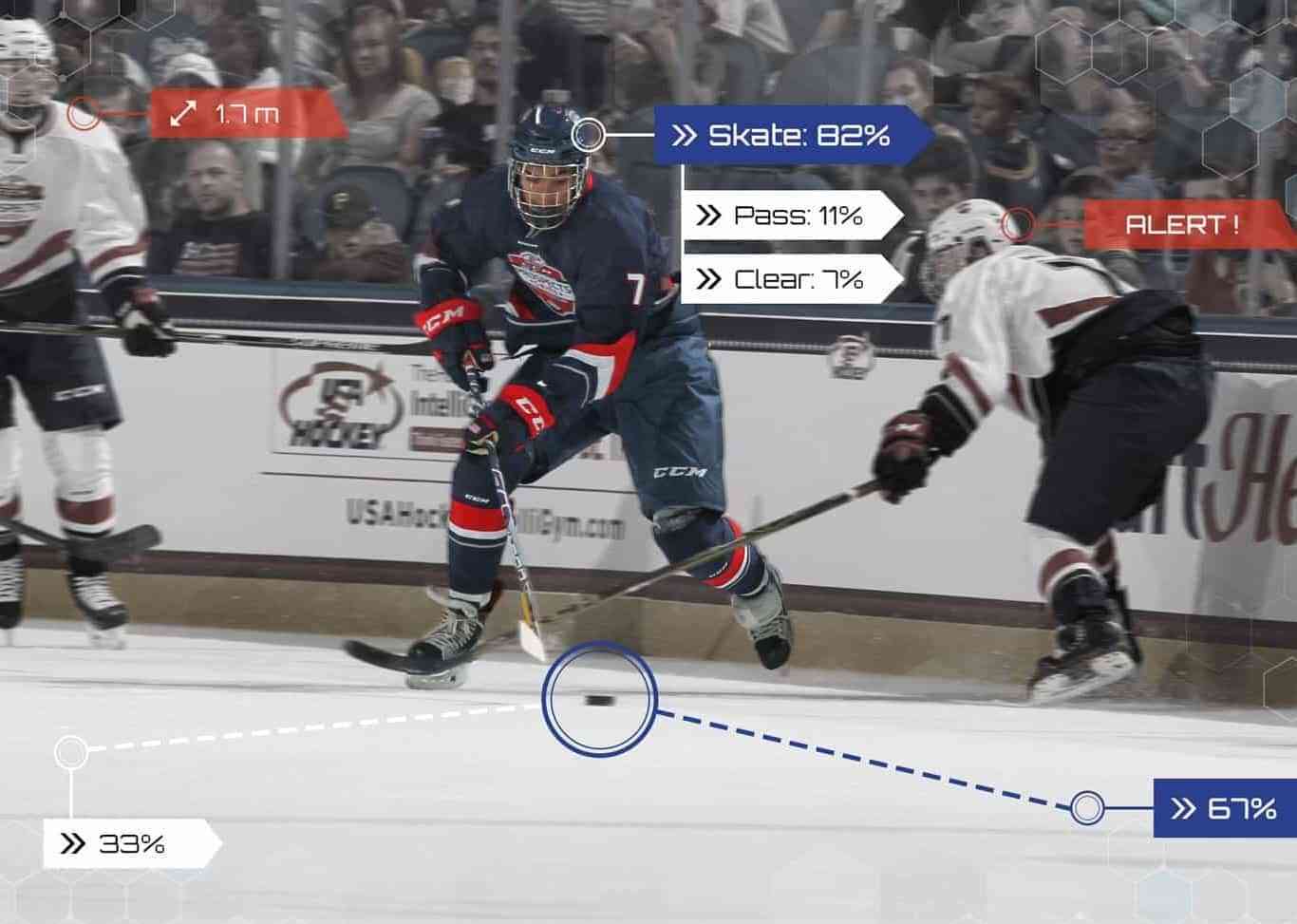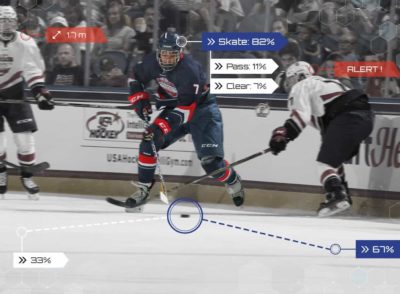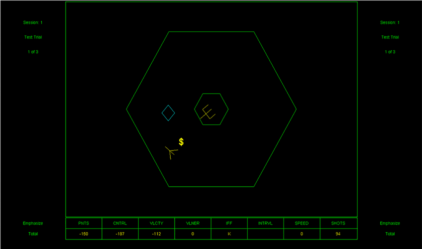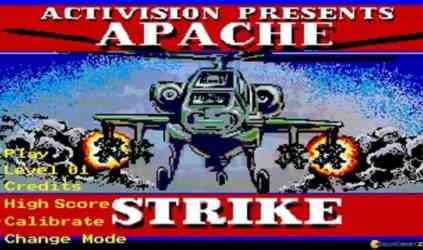The Origins of IntelliGym Cognitive Training Technology
The Origins of IntelliGym Cognitive Training Technology
How IntelliGym Brought Cognitive Training from the Sky to the Ice
The mind is the backbone of hockey intelligence. Hockey IQ – the ability to see the game develop before it happens, to instinctively know where to be or where your teammates are – is critical for success in hockey. The best players aren’t always the ones who are the biggest or the strongest, but they’re always the smartest. They possess incredible brainpower to be able to make the kinds of decisions they make, all while under intense pressure. And while some believe hockey sense is something you’re born with, IntelliGym has proven that it can be developed and strengthened with cognitive training.
Studies have shown that players can improve their performance on the ice by training their brains with the IntelliGym computer-based cognitive training program. Like this study here, about how USA Hockey players on the National Team Development Program U17 and U18 teams saw a 42% improvement in points-per-game after integrating the IntelliGym with their training routine. Tens of thousands of athletes, parents, and coaches have seen similar improvements too.
We know that IntelliGym works to improve performance. Using the computer-based training program 2 times per week for 30 minutes on the computer as part of an ongoing training routine can lead to improved on-ice performance in as little as 5 weeks. But where did this incredible technology come from?

Hockey players have to make quick decisions under pressure, using cognitive skills including anticipation, divided attention, situational awareness.
How IntelliGym Brought Cognitive Training from the Sky to the Ice
The mind is the backbone of hockey intelligence. Hockey IQ – the ability to see the game develop before it happens, to instinctively know where to be or where your teammates are – is critical for success in hockey. The best players aren’t always the ones who are the biggest or the strongest, but they’re always the smartest. They possess incredible brainpower to be able to make the kinds of decisions they make, all while under intense pressure. And while some believe hockey sense is something you’re born with, IntelliGym has proven that it can be developed and strengthened with cognitive training.

Hockey players have to make quick decisions under pressure, using cognitive skills including anticipation, divided attention, situational awareness.
Studies have shown that players can improve their performance on the ice by training their brains with the IntelliGym computer-based cognitive training program. Like this study here, about how USA Hockey players on the National Team Development Program U17 and U18 teams saw a 42% improvement in points-per-game after integrating the IntelliGym with their training routine. Tens of thousands of athletes, parents, and coaches have seen similar improvements too.
We know that IntelliGym works to improve performance. Using the computer-based training program 2 times per week for 30 minutes on the computer as part of an ongoing training routine can lead to improved on-ice performance in as little as 5 weeks. But where did this incredible technology come from?
Fighter Pilots Improve Decision Making with Computer-Based Training Game
The underlying concept was developed by DARPA, the Defense Advanced Research Projects Agency, to learn about cognitive development. The technology, a computer-based training game called Space Fortress, was then used to study Air Force pilots, which are subject to extremely high cognitive demands during flight and must make complex decisions quickly and accurately. The study aimed to show how regular training with Space Fortress could enhance pilots’ ability to cope with the challenging demands of flight. Prof. Daniel Gopher, who served as Research Supervisor at IntelliGym during development, was one of the original researchers.
Prof. Gopher is one of the world’s leading figures in the field of cognitive engineering and cognitive training. He is a fellow of the US Human Factors and Ergonomics Society and a Professor of Cognitive Psychology and Human Factors Engineering at Technion, Israel’s Institute of Science, so he knows a thing or two about the brain. In 1994, he published an award-winning article, titled Transfer of Skill from a Computer Game Trainer to Flight, which discussed the results of his study on training Israeli Air Force pilots using the DARPA technology.
“What research over the last 15–20 years has shown is that cognition, or what we call thinking and performance, is really a set of skills that we can train systematically. And that computer-based cognitive trainers or “cognitive simulations” are the most effective and efficient way to do so.”
Prof. Daniel Gopher
Research Supervisor, IntelliGym
Prof. Gopher’s study set out to determine the effects of the computer-based training game on flight performance. The results, which can be seen here, were mind-blowing! They validated that strengthening a pilot’s cognitive skills through a computerized training game could improve their performance in real flight scenarios. Thanks to the findings, the game became a regular component of the training program for the Israeli Air Force. Soon, others started to gain interest.
NASA Studies Cognitive Training Program for US Air Force Officers
Prof. Gopher’s study was followed with research conducted on US Air Force Officers by NASA’s Ames Research Center in Silicon Valley in 1994. The NASA study was designed to verify the results from Dr. Gopher’s study and prove that cognitive training program could lead to improve performance in-flight. However, the objective went even further and aimed to determine whether training with Space Fortress was more effective than training with an actual video game, called Apache Strike.
We hear this debate all the time – is training with the IntelliGym truly more effective than playing EA Sports NHL with all the fancy graphics and realistic gameplay?
This study, one of many similar studies, confirms the truth, as the Space Fortress group scored significantly higher in performance evaluations than the Apache Strike group or the control group. The results can be seen here. Taken together with the results of Gopher’s study, the research shows that properly designed cognitive training programs that train the basic cognitive skills required for complex tasks are more effective than video games that are designed for fun.


Comparison between the low-fidelity Space Fortress and high-fidelity Apache Strike. As Prof. Gopher discovers, the only “fidelity” that matters is cognitive fidelity.
Gopher continued to research the brain and discovered that the key to this ability to improve performance is called Cognitive Fidelity. It is critical for the mental demands of the training task to match the actual mental demands that occur during the real task. Video games, while enjoyable, do not stress the attention-control, anticipation, or decision-making skills of flying a plane or playing a game of hockey.
Next step, was to determine what to do with this technology.
NASA Studies Cognitive Training Program for US Air Force Officers
Prof. Gopher’s study was followed with research conducted on US Air Force Officers by NASA’s Ames Research Center in Silicon Valley in 1994. The NASA study was designed to verify the results from Dr. Gopher’s study and prove that cognitive training program could lead to improve performance in-flight. However, the objective went even further and aimed to determine whether training with Space Fortress was more effective than training with an actual video game, called Apache Strike.
We hear this debate all the time – is training with the IntelliGym truly more effective than playing EA Sports NHL with all the fancy graphics and realistic gameplay?
This study, one of many similar studies, confirms the truth, as the Space Fortress group scored significantly higher in performance evaluations than the Apache Strike group or the control group. The results can be seen here. Taken together with the results of Gopher’s study, the research shows that properly designed cognitive training programs that train the basic cognitive skills required for complex tasks are more effective than video games that are designed for fun.


Comparison between the low-fidelity Space Fortress and high-fidelity Apache Strike. As Prof. Gopher discovers, the only “fidelity” that matters is cognitive fidelity.
Gopher continued to research the brain and discovered that the key to this ability to improve performance is called Cognitive Fidelity. It is critical for the mental demands of the training task to match the actual mental demands that occur during the real task. Video games, while enjoyable, do not stress the attention-control, anticipation, or decision-making skills of flying a plane or playing a game of hockey.
Next step, was to determine what to do with this technology.
Ex-Air Force Pilots Team Up With Gopher to Create Cognitive Training Program for Sports
IntelliGym was inspired by this fighter pilot technology which proved that trainees could significantly improve their flight skills by using computer-based training tools outside of physical practice. It was this science and research that led us to create a training program using the technology behind Space Fortress to help young athletes improve their mental game.
In order to develop a cognitive training tool for sports, we had to map the cognitive skills that are required for elite performance in hockey. With this map in hand, and with the help of USA Hockey, IntelliGym’s team of researchers, engineers, and scientists – including Prof. Gopher, of course – designed a system that challenges those exact same skills.
Strangely enough, it was found that from a cognitive perspective, flying a jet is similar to playing sports. Quick decision making under pressure, divided attention, attention control, anticipation, spatial orientation, and execution are all skills in common. It was a perfect fit for the original technology to help thousands of motivated athletes improve their performance.
“We have seen that teams and individuals using IntelliGym improve their performance significantly. From the skill development point of view, we have seen players improve their positional awareness, ability to predict what is going on in the game, and ability to make fast and good decisions. Players quickly develop attention-allocation strategies that enable them to better participate in the game.”
Prof. Daniel Gopher
Research Supervisor, IntelliGym
How the Hockey IntelliGym Can Help You and Your Team Improve Performance
15 years, 3 sports, and over 35,000 athletes later, today the IntelliGym helps athletes train their brains similar to how fighter pilots train theirs, improving their cognitive skills and enhancing their on-field performance. There are even clues that IntelliGym training can help reduce an athlete’s chance or injury.
While we don’t suggest cognitive training as a complete replacement for on-ice practice, we’ve shown time and time again that adding it to your routine enhances player development and improves performance.
And, would you really doubt something that’s been proven by NASA?
About the Research

